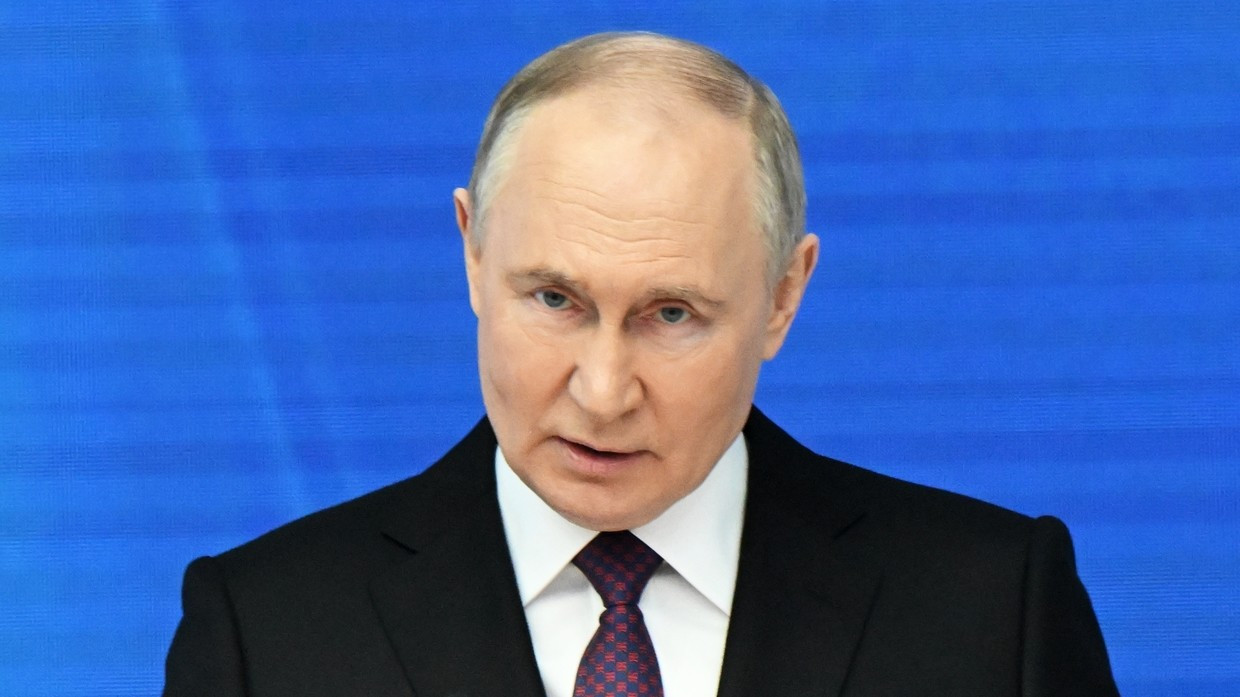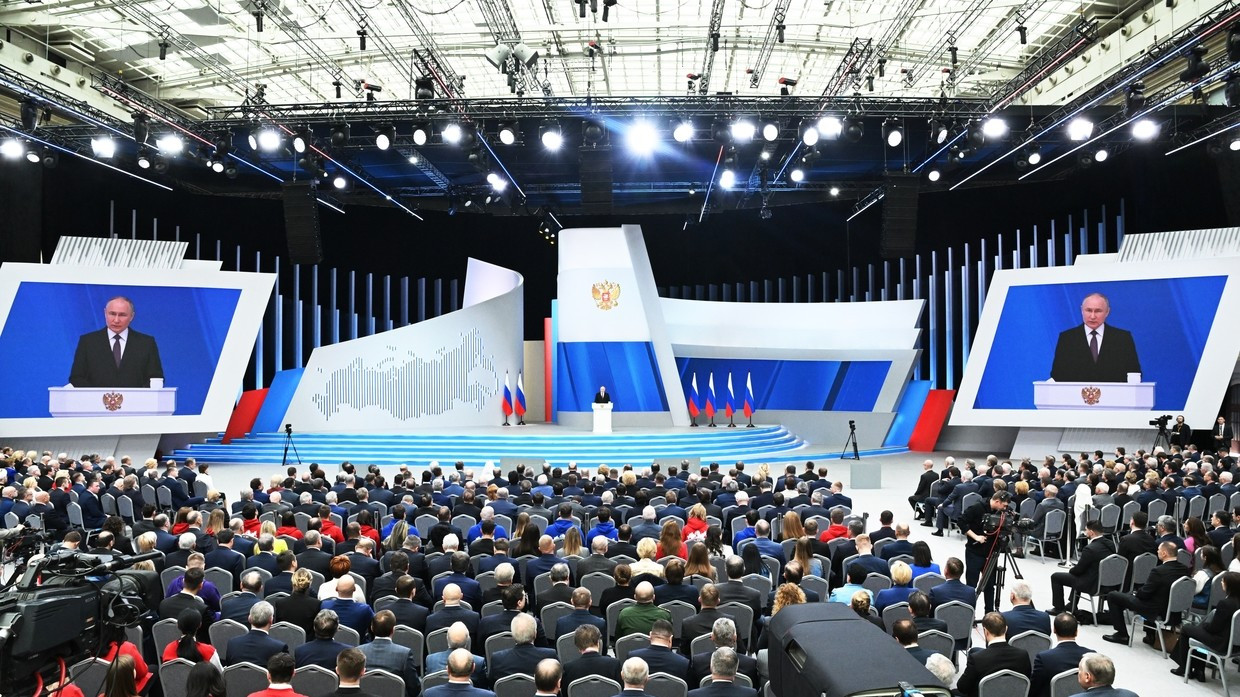Key points of President Putin's speech to the Federal Assembly of Russia
(Baonghean.vn) - According to RT, the Russian leader talked about issues such as the Ukraine conflict, international relations and the country's socio-economic development.
Russian President Vladimir Putin has addressed the Federal Assembly, the country's legislative body, detailing the country's future development plans and strategic goals. The speech, which set a record for its length, came just two weeks before the Russian presidential election, in which Putin is running for another term.
In his speech, which lasted 2 hours and 6 minutes, Mr. Putin touched on the international geopolitical agenda but also spent most of his time focusing on domestic issues. He announced five new national projects, set a number of targets for 2030 and proposed a number of tax reforms and other economic and social initiatives.

Russia will overcome the containment plots
President Putin declared that Russia has proven that it is capable of solving the most difficult problems and challenges, can repel “the aggression of international terrorism” and maintain national unity, despite Western attempts to divide Russia as it did Ukraine and turn it into a “dependent, dying, dead space where they can do whatever they want” by sowing national conflicts.
In the coming time, President Putin emphasized that Russia will continue to protect its freedom, preserve its history and traditions, further develop democratic institutions and protect its sovereignty, not allowing anyone to interfere in its internal affairs.
Russia's military potential
Russia's combat capabilities have increased significantly over the past few years, as its forces have gained extensive combat experience and a new generation of talented commanders has emerged who are able to competently perform missions, use new equipment and solve diverse tasks.
The country's strategic nuclear forces have also been modernized with the latest hypersonic technology, Mr. Putin said, adding that they will continue to be equipped with increasingly effective weapons.
The Russian president also said that the Burevestnik cruise missile with unlimited range and the Poseidon underwater drone are being perfected, while the first Sarmat heavy ballistic missiles have been delivered to the Russian army and will soon be “demonstrated in operational areas.”
Dialogue with the US
President Putin said that Russia is still ready for dialogue with the United States on issues of strategic stability, but accused Washington of hypocrisy in its treatment of Moscow, publicly calling for Russia's strategic defeat on the battlefield, in order to turn the country into a "withered space" like it did with Ukraine.
“We are dealing with a country whose leaders are openly carrying out hostile actions against us,” Mr. Putin said. At the same time, the Russian president declared that “they want to replace Russia with a space of dependence, withering, dead, where they can do whatever they want.”
The Russian President also said that the West is trying to drag Russia into an arms race and stressed the importance of developing the defense-industrial complex in a rational manner to increase the country's scientific, technological and industrial potential.

NATO threat
President Putin said it was important to strengthen Russia's forces along its western borders to neutralize threats associated with NATO's eastward expansion and the accession of Sweden and Finland to the alliance.
“The West has been provoking conflicts in Ukraine, the Middle East and other parts of the world and continues to lie. Now, shamelessly, they are claiming that Russia allegedly intends to attack Europe,” Putin said, calling such accusations “nonsense.”
The US and its satellites have effectively “destroyed the European security system” and are trying to scare the world with threats of a nuclear conflict that could end human civilization, he added.
“Russophobia, like other ideologies of racism, national superiority and privilege, actually blinds and deprives people of reason,” Mr. Putin surmised, stressing that the West’s actions “create risks for everyone.”
BRICS and the collapse of monopolies
Mr Putin said Russia was trying to unite the world's efforts as new global economic challenges emerged amid the collapse of former monopolies, noting that the G7 group had lagged behind the BRICS countries in terms of its share of global GDP.
“Such a global trend is inevitable,” Putin said, adding that Russia, together with friendly countries from the Middle East, Asia, Africa and Latin America, would continue to build a new global financial architecture free of political interference, while the West discredits its own currencies and banking systems.
Russia is a stronghold of traditional values.
Mr. Putin noted that while some Western countries are “deliberately destroying moral norms and family institutions” and pushing their countries to the brink of destruction, Russia has chosen life and remains a bastion of traditional values on which humanity has developed. “Our choice is the same as that of most people in the world, including millions of citizens of Western countries,” he said.
Falling birth rate
The President acknowledged that Russia, like many other countries, is facing a declining birth rate and suggested that all levels of government, civil society and leaders of traditional religions should work together to make large families a social norm, a philosophy of public life and a guideline for state strategy.
To achieve sustainable growth in the birth rate over the next six years, Mr. Putin said, Russia will focus on supporting and improving the quality of life of families, by extending the maternity fund program until 2030 and providing more financial benefits, such as tax deductions for families with many children.
National projects
Mr Putin announced that federal support for families would be one of five new national projects. The first, called “Family”, will focus on increasing the birth rate and improving the quality of life for families with children.
The “Youth of Russia” and “Human Capital” projects will focus on education and employment to secure the country’s future by increasing payments to schools and teachers, especially those in small cities, towns and villages, modernizing kindergartens, schools and universities to strengthen connections between levels of education, and working with employers to help young people find jobs.
Mr Putin also announced the “Live Long and Actively” project, which aims to increase the average life expectancy in Russia to at least 78 years by 2030. The initiative will include the construction of sports facilities, the modernization and construction of more clinics, as well as tax deductions for people who undergo regular health check-ups.
The fifth project, called “Data Economy,” will focus on investing about 700 billion rubles ($7.6 billion) over the next six years to create digital platforms in all sectors of the economy and society, increase the capacity of domestic supercomputers by at least tenfold by 2030, and provide high-speed internet access to almost the entire country in the next decade.
Other issues
In addition to what falls within the scope of the five new national projects, Mr. Putin also mentioned the importance of addressing issues such as tax reform, which would ensure “a fairer distribution of the tax burden” among those with higher personal and corporate incomes, and would provide incentives for small businesses.
The Russian government also continues to implement the federal “Clean Water” project, which focuses on reducing harmful emissions into the atmosphere and water pollution.
Russia will also strive to increase the contribution of tourism to the country's GDP to 5% by 2030 and increase the number of tourists to 140 million a year, Putin said. To achieve this goal, the government will launch a long-term program to preserve cultural heritage and allocate additional funds to improve historic city centers.
